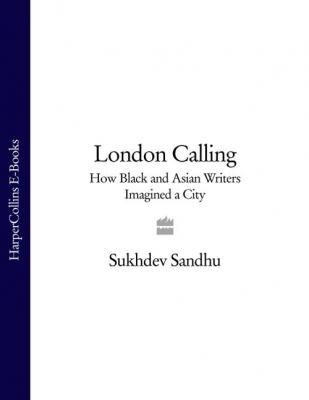London Calling: How Black and Asian Writers Imagined a City. Sukhdev Sandhu
Читать онлайн.| Название | London Calling: How Black and Asian Writers Imagined a City |
|---|---|
| Автор произведения | Sukhdev Sandhu |
| Жанр | Социология |
| Серия | |
| Издательство | Социология |
| Год выпуска | 0 |
| isbn | 9780007397495 |
London Calling
How Black and Asian Writers Imagined a City
SUKHDEV SANDHU
For – and because of – Puran Singh and Jagir Kaur Sandhu
Contents
3. Coasting a Lime on the Serpentine
P.S. Ideas, Interviews & Features …
A Conversation with Sukhdev Sandhu
Lo, lovely London, rich and fortunate,
Famed through the world for peace and happiness1
THESE FLORID SENTIMENTS were ascribed to a ‘stranger from the parching zone’ by the playwright George Peele in 1585. They divert and confound: did an African really speak these lines? It seems scarcely credible for black people to have been living and working in London as far back as the sixteenth century. Yet they curiously anticipate the lyrics of ‘London Is The Place For Me’ which the calypsonian Lord Kitchener freestyled upon disembarking from the SS Empire Windrush at Tilbury Docks in 1948, the year commonly thought to mark the arrival of dark-skinned foreigners to England.
The words were actually delivered by a white actor. Peele was writing for the Lord Mayor’s Pageant, a festival of London’s merchant capitalists held annually throughout the sixteenth and seventeenth centuries to mark the investiture of the incoming Mayor. Many merchants, as brash and exhibitionist as City traders and early dot-com entrepreneurs, used the occasion to show off. In particular, they liked to flaunt their success by draping negroes in fabulously expensive silks, pearls and jewels. At one pageant a pair of elaborately dressed Moors were mounted on leopards, waving the banners of the Skinners’ Company and the City of London. At another, a black youth was transported through the capital on top of a life-size model of the Grocers’ Company crest – an elaborately carved camel – while he hurled raisins, almonds and prunes at the thousands of cheering spectators. On his head he wore a feathered wreath. At his sides stood two goddesses representing Plenty and Concord.2
This cavalcade – extravagant, absurd, oddly affecting – is by no means an isolated example of how black people have been enlivening the life of the capital over the centuries. For the African presence in London spans the millennium. Writing with that strange mixture of churlishness and chiliasm, relish and repugnance, to which critics of the metropolis have often resorted, Richard of Devizes claimed in his twelfth-century Chronicle that the city was a hive of perversity and attracted ‘Stage players, buffoons, those that have no hair on their bodies, Garamantes [i.e. Moors], pickthanks, catamites, effemoinate sodomites, lewd musical girls, druggists, lustful persons, fortune-tellers, extortioners, nightly strollers, magicians, mimics, common beggars, tatterdemalions’.3
During the sixteenth century more and more black faces could be seen in the capital. A trumpeter from Africa, known as John Blanke (i.e. John White), played for both Henry VII and Henry VIII. A painted roll belonging to the College of Arms shows him blowing his horn at the 1511 Westminster Tournament held to celebrate the birth of a son, the short-lived Prince Henry, to Catherine of Aragon. In the summer of 1555 a merchant’s son called John Lok imported five Africans to London. He hoped that they might learn sufficient English for them to be able to return to the West African coast and act as interpreters for metropolitan traders eager to challenge the Portuguese control of slave-trafficking.
By the 1570s black people were being brought to England fairly regularly. They were employed as household servants, prostitutes, and court entertainers. Their visibility far exceeded their numerical presence and allowed Queen Elizabeth I to make political capital in 1601 by issuing a proclamation ordering their expulsion. In doing so she announced that she was
highly discontented to understand the great numbers of negars and Blackamoores which (as she is informed) are crept into this realm … who are fostered and relieved here to
